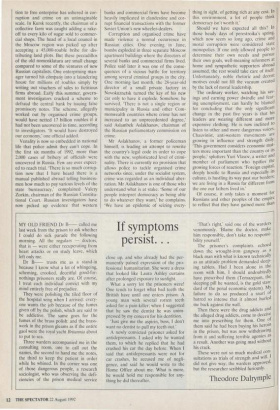If symptoms
persist.. .
MY OLD FRIEND Dr B— called me last week from the prison to ask whether I could do sick parade the following morning. All the regulars — doctors, that is — were either recuperating from heart attacks or on study leave, which left only me.
Dr B trusts me as a stand-in because I know what a lot of whingeing, scheming, crooked, deceitful good-for- nothings prisoners really are. Of course, I treat each individual convict with my mind entirely free of prejudice.
They were polishing the tiled floor of the hospital wing when I arrived: every- one wants the job because of the fumes given off by the polish, which are said to be addictive. The same goes for the fumes of the brass polish: and the brass- work in the prison gleams as if the entire gaol were the royal yacht Britannia about to put to sea.
Three warders accompanied me in the consulting room, one to call out the names, the second to hand me the notes, the third to keep the patient in order while he whined. In the corner was one of those dangerous people, a research sociologist, who was observing the defi- ciencies of the prison medical service close up, and who already had the per- manently pained expression of the pro- fessional humanitarian. She wore a dress that looked like Laura Ashley curtains after prolonged exposure to sunlight.
What a sorry lot the prisoners were! One tends to forget what bad teeth the British have until one enters prison. A young man with several rotten teeth asked for a pain-killer; when I suggested that he saw the dentist he was unim- pressed by my concern for his dentition.
`Just give me the aspirin, boss, I don't want no dentist to pull my teeth out.'
A newly convicted prisoner asked for antidepressants. I asked why he wanted them, to which he replied that he had crashed his car the day before. When I said that antidepressants were not for car crashes, he accused me of negli- gence, and said he would write to the Home Office about me. What is more, he would hold me responsible for any- thing he did thereafter.
`That's right,' said one of the warders venomously. 'Blame the doctor, make him responsible, don't take no responsi- bility yourself.' The prisoner's complaints echoed down the wrought-iron gangway as a black man with what is known technicallY as an attitude problem demanded sleep- ing tablets. Had I been alone in the room with him, I should undoubtedlY have prescribed them (Temazepam, the sleeping pill he wanted, is the gold stan- dard of the penal economic system). My failure to do so produced a snarl of hatred so intense that it almost hurled me back against the wall.
Then there were the drug addicts and the alleged drug addicts, come to deceive me into prescribing for them. One of them said he had been buying his heroin in the prison, but was now withdrawing from it and suffering terrible agonies as a result. Another was going mad without his crack.
These were not so much medical con- sultations as trials of strength and will. I did not give way; the warders approved, but the researcher scribbled furiously.
Theodore Dalrymple










































 Previous page
Previous page